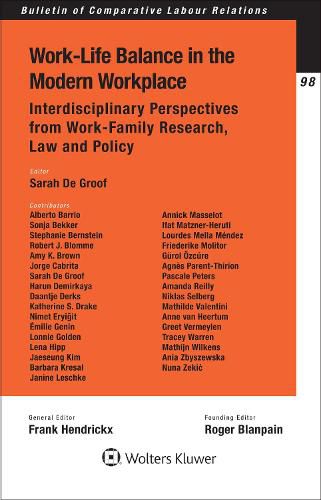Readings Newsletter
Become a Readings Member to make your shopping experience even easier.
Sign in or sign up for free!
You’re not far away from qualifying for FREE standard shipping within Australia
You’ve qualified for FREE standard shipping within Australia
The cart is loading…






Bulletin of Comparative Labour Relations Volume 98
Work-Life Balance in the Modern Workplace provides insights into labour law’s challenges from a work-life balance perspective. The term ‘work-life balance’ refers to the relationship between paid work in all of its various forms and personal life, which includes family but is not limited to it. In addition, gender permeates every aspect of this relationship. This volume brings together a wide range of perspectives from a number of different disciplines, presenting research findings and their implications for policy at all levels (national, sectoral, enterprise, workplace). Collectively, the contributors seek to close the gap between research and policy with the intent of building a better work-life balance regime for workers across a variety of personal circumstances, needs and preferences.
What’s in this book:
Among the issues and topics covered are the following:
differences and similarities between men and women and particularly between mothers and fathers in their work choices;
‘third shift’ work (work at home at night or during weekends);
effect of the extent to which employers perceive management of this process to be a ‘burden’;
employers’ exploitation of the psychological interconnection between masculinity and breadwinning;
organisational culture that is more available for supervisors than for rank-and-file workers;
weak enforcement mechanisms and token penalties for non-compliance by employers;
trade unions as the best hope for precarious workers to improve work-life balance;
crowd-work (on-demand performance of tasks by persons selected remotely through online platforms from a large pool of potential and generic workers);
an example of how to use work-life balance insights to evaluate the law;
collective self-scheduling;
employers’ duty to accommodate; and
financial hardship as a serious threat to work-life balance.
How this will help you:
This book encourages to think on how labour law and work and family research can cooperate and reinforce each other. This rich collection of chapters clearly shows that work-life conflict is associated with negative health outcomes, gender inequalities and many other concerns and thereby resonates particularly with concerned lawyers and legal academics who ask what work-life balance literature has to offer and how law should respond.
$9.00 standard shipping within Australia
FREE standard shipping within Australia for orders over $100.00
Express & International shipping calculated at checkout
Bulletin of Comparative Labour Relations Volume 98
Work-Life Balance in the Modern Workplace provides insights into labour law’s challenges from a work-life balance perspective. The term ‘work-life balance’ refers to the relationship between paid work in all of its various forms and personal life, which includes family but is not limited to it. In addition, gender permeates every aspect of this relationship. This volume brings together a wide range of perspectives from a number of different disciplines, presenting research findings and their implications for policy at all levels (national, sectoral, enterprise, workplace). Collectively, the contributors seek to close the gap between research and policy with the intent of building a better work-life balance regime for workers across a variety of personal circumstances, needs and preferences.
What’s in this book:
Among the issues and topics covered are the following:
differences and similarities between men and women and particularly between mothers and fathers in their work choices;
‘third shift’ work (work at home at night or during weekends);
effect of the extent to which employers perceive management of this process to be a ‘burden’;
employers’ exploitation of the psychological interconnection between masculinity and breadwinning;
organisational culture that is more available for supervisors than for rank-and-file workers;
weak enforcement mechanisms and token penalties for non-compliance by employers;
trade unions as the best hope for precarious workers to improve work-life balance;
crowd-work (on-demand performance of tasks by persons selected remotely through online platforms from a large pool of potential and generic workers);
an example of how to use work-life balance insights to evaluate the law;
collective self-scheduling;
employers’ duty to accommodate; and
financial hardship as a serious threat to work-life balance.
How this will help you:
This book encourages to think on how labour law and work and family research can cooperate and reinforce each other. This rich collection of chapters clearly shows that work-life conflict is associated with negative health outcomes, gender inequalities and many other concerns and thereby resonates particularly with concerned lawyers and legal academics who ask what work-life balance literature has to offer and how law should respond.